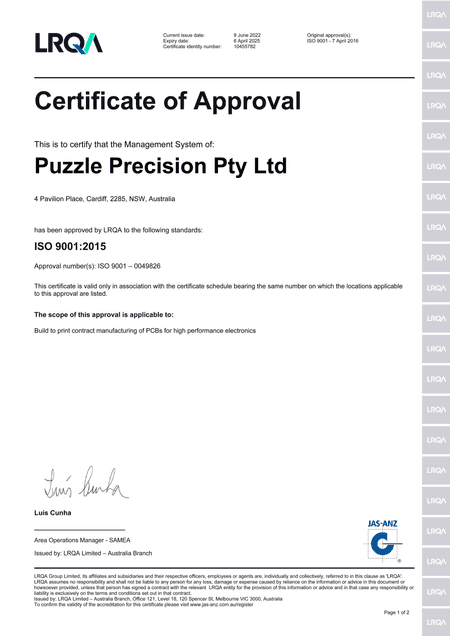Qualifications
Certified IPC Trainers
To ensure a high quality assembly and compliance to contractual obligations, we have multiple certified IPC Trainers & Specialists on-site for all parts of the assembly process.

IPC J-STD-001
This standard describes materials, methods and acceptance criteria for producing soldered electrical and electronic assemblies. The intent of this document is to rely on process control methodology to ensure consistent quality levels during the manufacture of products. Puzzle Precision have a Certified IPC Trainer (Instructor) and multiple Certified IPC Specialists for this standard.

IPC-A-610
This standard is a collection of visual quality acceptability requirements for electronic assemblies. This document presents acceptance requirements for the manufacture of electrical and electronic assemblies. Puzzle Precision have a Certified IPC Trainer (Instructor) and multiple Certified IPC Specialists for this standard.

IPC-7711/7721
This standard covers the procedural requirements, tools and materials and methods to be used in the modifiations, rework, repair, overhaul or restoration of electronic products. Puzzle Precision have a Certified IPC Trainer (Instructor) and multiple Certified IPC Specialists for this standard.

IPC/WHMA-A-620
This standard describes materials, methods, tests and acceptability criteria for producing crimped, mechanically secured, or soldered interconnections and the related assembly activities associated with cable and harness assemblies. Puzzle Precision have a Certified IPC Trainer (Instructor) and multiple Certified IPC Specialists for this standard.
MIL-STD-2000
We have multiple operators trained to MIL-STD-2000.
Quality Management System
We operate in compliance with our AS/NZS ISO 9001:2015 certified QMS and are commited to the continual improvement of our processes and systems.

DISP Membership
DISP membership was obtained in November 2020.
Metallurgical Engineering
Our qualified metallurgical engineering staff strategically design and adjust the assembly processes for each job to suit the ever-changing variety of component and board finishes supplied. This ensures that resulting solder joints and alloy compositions are compliant and robust, and that all components have been soldered using suitable temperature profiles.